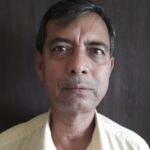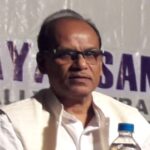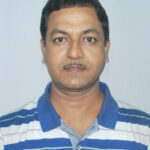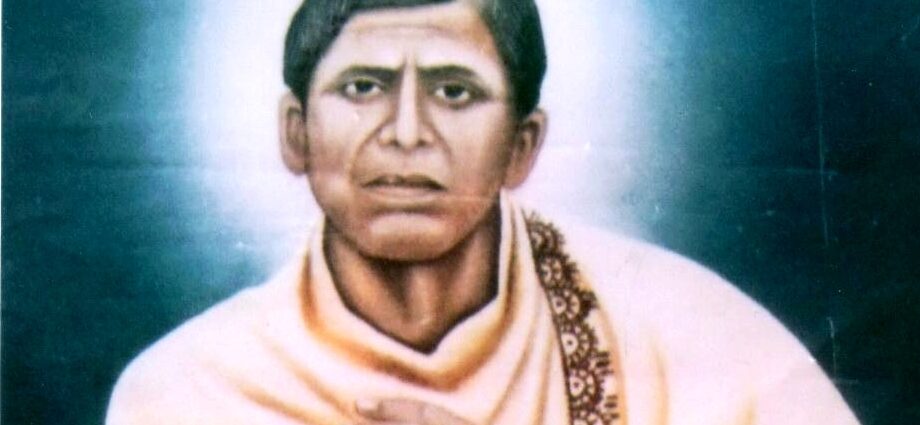Sri Santosh Kumar Barui
Translated by Debabrata Das
It was through the direct intervention of Sri Guruchand Thakur, that the great event was organised at the residence of Ishwar Gayen of Khulna district in the presence of more than five thousand people, in 1881, to unite all the Dalits, outcasts and untouchables, the way the mission to liberate India from the British rule by uniting the people of the country was undertaken by the Indian National Congress later on, formed under the aegis of Octavian Hume though. This noble initiative to inspire the illiterate and downtrodden people to the spirit of unity had created the much-needed uproar in the mental landscape of the downtrodden. The picture of mental limitations of the people of this society, with regard to their understanding of the idea of unity, has been aptly reflected in the works of the poet Mahananda Halder on this issue. It is unfortunate that some people questioned the necessity of such an initiative at a time when the spirit of self-realisation was awakening in every nook and cranny of Bengal. Some insects remain content in their cocoons, thinking, “I’m quite happy about my position. No point bothering about reaching higher position.” Unfortunately, they still think “I’m quite happy about my position” even after being badly thrashed, kicked at the back and being deprived of their rightful share of civilisation for ages! Acharya Mahananda Halder has aptly portrayed these self-defeating inner thoughts of the people of this society in his writings. The nation will progress, so will some people. They will forget their tainted activities, their self-defeating psyche. Acharya Mahananda has presented these characteristic features of the downtrodden section of society, pointing out their alienating attitude in 1881, in his book “Sri Sri Guruchand Charit” in the following manner:
“We live in a selfish world
We are lost in selfish thoughts
Our places are divided
By selfish words and thoughts.”1
Though the lower-caste people of Bengal, especially those from the Namasudra community, were physically stout, thanks to the pleasant weather and nutritious food of the region, their knowledge of things was extremely limited. This truth has been objectively exposed in the article “Sabhabarta”. The outcast communities failed to realise the importance of intellectual awakening and the power of unity. They were busy using their indigenous weapons against their own people and exhausting their creative energy in fighting. The greatness of Sri Guruchand Thakur chiefly lies in the fact that he had inspired these untouchable communities, including the Namasudras, to the spirit of unity by driving away their stupidity. Thus, it is unquestionably proved that the grand meeting at Duttadanga was the declaration of the triumph of a people, the beginning of a new journey towards victory.
Despite being the proponent of a religion and a holy man, clear signs of modern Western thoughts could be seen in the way Sri Guruchand lived his life and things he did during his lifetime. English education system had revolutionary impact on the psychic landscape of Bengal as well as India. Sri Guruchand Thakur had planned to transform the socio-economic reality of this country by removing old and reactionary thoughts, especially from the minds of rural and outcast communities, the way Raja Ram Mohan Roy, Prince Dwarkanath Tagore, Keshab Chandra Sen, Pandit Ishwar Chandra Vidyasagar had taken the initiative to change the Indian society by sowing the seeds of progressive Western civilisation and culture in the soil of India.
Sri Guruchand had provided enough confidence to the downtrodden communities through his royal gestures and highest dignity associated with all his activities. The gallant description of his departure for the Duttadanga meeting by Mahananda in his verse narrative reminds one of the departures of great kings and warriors for the conquest of the world in ancient times. Those kings and warriors were intoxicated by their dreams of triumph over other countries and possession of their wealth. Their chivalrous moves, gorgeous attire and strong desire for victory at the moment of departure had made them look like genuine heroes who are ready to beat the world. The joy in the eyes of their friends and followers knew no bounds! A sudden thunder and lightning of power and chivalry shook their body and mind alike!
Sri Guruchand was going to attend the meeting at the residence of Ishwar Gayen that day like an emperor. This royal journey, outside the religious circle for the first time, was a planned initiative to bring the lives of illiterate and ill-fated people on the path of progress and modern civilisation by generating self-awareness among those people. Sri Guruchand wanted to convey a clear message to those people through his royal attire and gestures that they must hold their head high always, and try to live like an emperor, the way he himself had been doing. This victorious journey of Sri Guruchand came to life in the hands of the poet Mahananda Halder. His lively, exceptional and exquisite rhymes overwhelm the readers again and again:
“Our Lord who lived like a poor
Came today deck’d as a king
We’ll know what is in his mind
Why he is dressed like a king.
The dazzling boat brings the angel
His face shadows the moon and sun
Passersby whisper where this man was
Who came today like the king’s son.”2
The historic speech of Swami Vivekananda at Chicago in America in 1893 had shaken the long-cherished ideas of the people of the world like never before. He pleasantly surprised the world by singing the supremacy of Vedanta or Hindutva philosophy in his glorious speech. There is no denying the fact that this historic speech of Vivekananda had earned enormous respect and high accolades for India from the international community, but this success could hardly do any good to the hunger-stricken lives of the people living on the fringes of the Indian society. The question remained whether India truly gained anything substantial from this historic event.
This priceless jewel of the Indian nation had indulged himself in the act of glorifying Hindutva philosophy all his life. The world honoured him with the golden crown of fame. But, no yardstick could ever be found to fathom the depth and significance of the invaluable speech of Sri Guruchand Thakur, delivered in the historic meeting of the people from backward communities at the residence of Ishwar Gayen of Duttadanga of Khulna District in undivided Bengal on the occasion of his father’s funeral ceremony. Interestingly, this speech of Sri Thakur was delivered in 1881, at least twelve years before the historic speech of Swami Vivekananda to be delivered at the famous World’s Parliament of Religions in Chicago in 1893. However, it would be unjust to compare the two historic speeches. Both of them are exceptional personalities in their respective places. Whereas one was involved in the act of projecting India as the best nation in the world, the other was self-engaged in the act of developing the nation in the true sense of the term.
Vivekananda had to hide certain truths while singing the glory of liberal Hindutva and spiritualism in the then best city of the world. Vivekananda deliberately overlooked the dark aspects of liberal Hindutva. He held the flag of the Indian civilisation high by mesmerising the people of Europe with the magic of his sharp rhetoric. For this, he had to carefully omit the dark aspects of Hindu religion. These high words of noble patriotism, love of Hindu religion, love of humanity, love of the country and the society of Vivekananda had hardly any impact on the rural society of Bengal, especially on backward communities. Many would raise their eyebrows at this analysis though. But still, what is the harm looking at those events with an objective eye? Vivekananda achieved magnitude through his works at the highest level, while Sri Guruchand selflessly and happily contributed at the grass-root level where the journey towards magnitude starts. He went to attend the historic meeting at Duttadanga with the indomitable desire to make an ideal society by wiping the dirt and removing evil rituals and narrowness from its body and also by educating each individual living in the society. It would be a perversion of truth and also highly deceitful if someone claims supremacy of his way of life and greatness of his culture at the international level and promoting his cultural path as the only path to universal peace and humanism, while within his own culture the demons of hatred, exploitation and untouchability towards a large community of human beings dwell happily!
Sri Guruchand’s mission of making India proud in the world outside started with his historic speech at Duttadanga and declaration of a series of outstanding initiatives from there. In that historic speech, Sri Guruchand had minutely described the theological journey of Hinduism, as well as of the Indian nation, from the Aryan Age to modern times; alongside that he described the importance of reincarnation of God, the essence of Buddhism, the history of the decline of Buddhism in India, and finally the reason behind the emergence of Sri Hari Thakur, at a historical juncture, with all his might, chivalry, reverence and love. Each and every word and advice of Sri Guruchand, the mightiest of all individuals and the conqueror of Time, is priceless, timeless as well. His words are universal in their appeal and have the power to save humanity from any whatsoever situation. He had shown the innocent participants of that meeting, who were full of energy and life-force, the heroic path to tread in life. He had also shown us, like an ascetic, the path to purgation. In a valiant voice he had taught the human world that they could release themselves from even the ugliest sins like taking away human life and get back peace of mind and pious joy by chanting the glory of their noble ancestors. He had assured all by quoting the story from the Purana:
“The king endlessly repents
His killing of human beings
Calls on the sages of his state
How he could get rid of his sins.
The sages advise him to sit
And recall his great ancestors
The sins of Janamejaya
Eroded when them he remembers.
His heart soothes on hearing their noble tales
The sin of killing human beings now melts.”3
Is there any deeper reason for referring to the ancient stories while addressing a gathering of modern individuals of the nineteenth century? Even though the time was moving fast on the track of modernity, the marginal people of rural Bengal failed to catch up with the pace. They lacked in modern aptitude and the power of reasoning. A sense of fear and inferiority dominated their souls. Sri Guruchand wanted to remove limitations caused by unnecessary fear and sense of inferiority from the minds of these people and guide them to a higher life by narrating this story from the Purana. The far deeper implications of this story can be realised if it is analysed in greater detail.
He wanted to specifically convey the message to people through his call for glorifying the life and acts of our noble predecessors that the noble soul and messiah of love, Sri Hari Thakur, appeared on earth for awakening self-consciousness among people. So, they should chant the glory of Sri Thakur. They should also chant his virtues. His sacred words are the only way to emancipation. Their minds, body and souls will be filled with purity and piousness by chanting those words. No evil forces like fear, cowardice or narrowness can dominate their selves ever again. The shrine of their minds will be full of might and vigour again. Only then they will be able to reach the unreachable fits. They will attain the power to live heroically, holding their head high and teaching the same to others, by destroying the sins of their state and their race.
Speaking highly of the Namasudra clan, elevating them to a higher level of consciousness, he declared in a thunderous voice that the Namasudras are not feeble. It is a mockery of the system that the Namasudras had been categorised as Shudra despite having divine blood in their body. The truth is Shudras are never lower than anyone, neither are they feeble by any means. It was through a biased and unjust evolution of history that they had got pushed into the margin of the society.
The purpose of Sri Guruchand for saying all these highly inspiring words was to lift the confidence of a people, especially at a time when the very existence of that people was in question. He said that the profession of Shudras was cultivation. The truth of this statement of Sri Guruchand was confirmed by the famous writer Nirmal Kumar Basu in his writing:
“Namasudras historically lived in those areas of Bengal, especially Eastern Bengal, where there were ample number of rivers and small wetlands. The upper-caste Hindu society has historically shown hatred towards this community of farmers. They have even forced this community to live on the fringes of their villages by calling them untouchables. Apart from cultivation, Namasudras consider rowing boats as the profession of their community.”4
The Namasudras were considered as outcast by the people from upper castes because of their profession. They lived outside the areas reserved for upper caste-people. As a result, people from Namasudra and other outcast communities, especially whose profession was cultivation, felt that they are low and despicable for quite a long time. In order to elevate these communities from their low psychic state, Sri Guruchand had shown that cultivation was the best of all professions, citing the example of Aryan sages. Cultivation was considered as the highest profession not in India alone but in the entire world. The Aryan sages had taken up this noble profession with pride. Therefore, cultivation can never be seen as a disrespectable job.
“There is no shame in farming
All the Aryans did it
In the days of the beginning”.5
It is quite clear from the speech of Sri Guruchand that he wanted to provide courage, confidence, inspiration, and strength of mind to the people through his inspiring words. He had given them all the good advices for this reason. He had described these outcast and untouchable races as people with noble minds and hearts. In the second part of his speech, he had explained the theory of origin of our planet and also the entire cosmos. What is inanimate in this world is unconscious. Therefore, the inanimate world is incapable of doing anything substantial. But in the same world there is strong consciousness in the human beings. The truth about the human soul can be realised through the power of consciousness. The moment this consciousness enlightens human souls in the light of wisdom, the Soul of the universe manifests itself before them. Those enlightened individuals learn the truth about the whole cosmos that very moment. The world is no more inanimate to those individuals. It becomes the abode of joy for those souls. The world then appears like heaven to them. The gap between life and death dissolves to an enlightened soul. Such mind attains enormous power and joy. That power of the mind feels restless to be united with the cosmic power, and sets off its journey towards that destination, leaving all sorts of bonds with this inanimate world behind. No one knows what happens after that metaphysical union. That charged soul makes a clarion call, unfolding its arms, to the supreme power just before the desired union— come, oh dear, come! Whenever the bond of the soul with this inanimate world lightens a bit, it flows like a massive current of water towards that ocean of heavenly power and finally jumps into it to get immersed in it. Thus the human soul, which was caught in multiple ties in this mundane life, is united with the boundless Soul. The unconscious human spirit becomes one with the conscious cosmic spirit.
In the third part of his speech, Sri Guruchand had explained a much deeper and intense theory. A supreme power controls the whole universe from behind the Nature like a guiding spirit. Whenever anarchy prevails in the world of Nature, that invisible supreme power manifests itself in a visible form to destroy the forces of evil and brings about peace on earth. Whenever there is violence, envy, rivalry and riots in the world, whenever it has come to a standstill, that guardian spirit has arrived on earth and cleared all those obstacles that blocked the path of Nature. It has provided order by destroying disorder. It has been described in an exquisitely lyrical manner in the words of the poet, Mahananda Halder:
“The guardian spirit of the universe
Measuring everything with his yardstick
Whenever anarchy shakes the world
He arrives and beats the barren and bleak.
The weighing scale of our universe shows
Often the order of Nature transgressed
He then appears again to save the world
By destroying the evil for the best.”6
Whenever the normal pace of this world is about to be hindered, that supreme spirit arrives readily on earth with its limitless power of consciousness. It destroys animosity, division, violence, rivalry and hatred and sends the holy message of supreme peace and equality to all the houses on earth. Sri Sri Hari Thakur, the greatest soul in the entire world, had arrived on earth with this holy message of Peace and Equality.
In the year 1881 when Sri Guruchand was delivering his historic speech on self-consciousness, as well as universal consciousness, at Duttadanga in his thunderous voice to the attendees and also to the entire nation, no political party was formed in India. In 1881, four years before the constitution of the Indian National Congress in 1885 under whose leadership the unconquerable desire of the people of India to taste the joy of liberty from the shackles of bondage was awakened, Sri Guruchand delivered to us the message of liberty, equality and insuppressible hope through his famous speech. While the Indian National Congress wanted to snatch freedom from foreigners, Sri Guruchand wanted to snatch freedom for those who had been living under the feet of the higher castes within Hinduism for centuries. That freedom was needed first.
The Indian National Congress had organised the common people of India for a massive mass resistance throughout the country to liberate them from the grip of the British merchants and subsequently capture the state machinery. But Sri Guruchand had shaken the whole existence of the oppressed and Dalit communities by instilling the dream of emancipation in their each and every sense through his historic speech, the unfailing result of which was the outbreak of a rigid and stern movement by these communities across villages, towns and ports. The unstoppable tide of that movement is still flowing. It is flowing within the hearts of every Dalit and other oppressed people even today. It will stop that day only when there shall be no more exploitation, deprivation, oppression and caste-based discrimination.
The purpose of Sri Guruchand’s all-pervading mass movement was to provide education to an uneducated society. He had indulged himself in the act of awakening an illiterate and barren community to the world of education. He wanted to make full use of the massively powerful human resource of India. How could that be possible if that human resource remained under the shadow of illiteracy and ignorance? How could the state and its people develop if the human resource is not properly utilised? How could they emancipate?
This is why the call for breaking all the ties and fetters of servitude and getting illuminated by the light of wisdom was made in the speech of Sri Guruchand. He had declared to the people of this country:
“If you desire freedom
Be learned, my brother.
Education kills woes
Makes happy forever.
My words to all species
Your mind is your power.
Education fears not
Nor begs from anyone
Gives King’s might, ends sorrow
Remember, Time spares none.
Lack of knowledge blinds all
All are lost in the dark.
Light up, kill illusion
Kill everything that’s dark.”7
Sri Guruchand was delivering his message of mass education and calling for a stubborn movement, through his speeches in the centre of the city, in towns and in the backward areas at a time when another educationist and great soul of Bengal was departing for eternity. The end of the educational movement initiated by Sri Vidyasagar due to his sad demise in the Bengali year 1298 and the beginning of the educational movement by Sri Guruchand in 1287— these two episodes had different implications. The fruit of the educational movement led by Vidyasagar was chiefly enjoyed by the people from the upper castes. The outcasts and the untouchables could only see that from a distance. There is no doubt about the greatness of Vidyasagar but the institution created by his boundless might got tainted by the exploitative caste system run by the upper caste, elite Hindus. The gate had remained closed for the untouchables. But the institution built through the stubborn struggle of Guruchand had opened its gate to the people of all classes and castes. There was no substantial difference between the two movements. However, while the purpose and aspirations of Vidyasagar got defeated by the blows of crude reality, Guruchand’s success dazzled like the rays of the sun and the light of the full moon.
Sri Guruchand had said, while explaining the theory of religion in the historic meeting at Duttadanga, that, though Lord Buddha appeared in this country with his message of non-violence, Buddhism had fallen flat on its face owing to the heinous conspiracy by the Brahminical religion against it. He could not find a place in this Brahmin-dominated country. However, Buddhism had and still has proud existence in the countries outside India.
Far-sighted Guruchand also wanted to convey that the extinction of Buddhism in India, the anarchy caused by the oppression and exploitation of people promoted by the merciless Brahminical scriptures and the desperate cries of the oppressed people paved the way for the arrival of Sri Hari Thakur, who had introduced the theory of sacred family, among the little-known, hated and deprived community of the Namasudras. Sri Harichand had saved the innocent members of all the families from the pit of a poisonous sin and guided them to a higher world of consciousness, at a time when the institution of family was completely disintegrating due to rampant adultery. He had declared the age-old theological practice of leaving family in order to lead a life of meditation and contemplation of God in the caves or in the forests as a practice against the need of the hour. Family is the heavenly abode of great souls. The land of gods is heaven. Sri Hari Thakur wanted to build heaven within the family.
The quintessential points of the historic speech of Sri Guruchand, delivered in the meeting at Duttadanga, are the progress of this world, awakening of universal humanism, abolishing the unequal social system, ensuring equal rights for all human beings, end of casteism, and establishment of universal unity and brotherhood through the coexistence of love and reverence.
References:
- Sri Guruchand Charit, Acharya Mahananda Halder, p. 113
- Sri Guruchand Charit, Acharya Mahananda Halder, p. 115
- Sri Guruchand Charit, Acharya Mahananda Halder.
- Bangadarpan, Part- III, Chief Editor: Pabitra Sarkar, Nirmal Kumar Basu, p. 398
- Sri Guruchand Charit, Acharya Mahananda Halder, p. 123
- Sri Guruchand Charit, Acharya Mahananda Halder, p. 124
- Sri Guruchand Charit, Acharya Mahananda Halder, p. 130
Debabrata Das is an Assistant Professor of English, Rabindra Bharati University. He is doing his Ph.D. research under supervision of Dr Amit Bhattacharya, Professor of English, University of Gour Banga, Malda. He submitted this translation in July, 2021.




